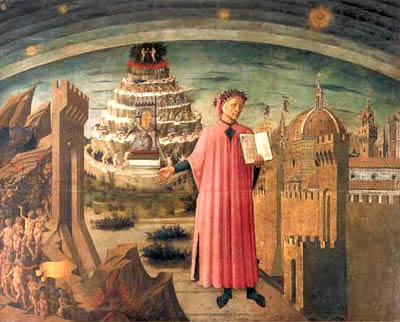The man we know simply as Dante was Dante Alighieri (1265-1321), Florentine, minor aristocrat, political activist, scholar, writer, poet husband, father and exile, known universally and for ever by his Christian name alone. Aside from biblical characters, Greek philosophers, saints, gods, godesse and a stringo f show-biz persons, not many people are remembered by their first name only. Another one, however, is Beatrice. In real life she was Bice Portinari ( Bice is still a common enough diminuitive of Beatrice) and Dante says he saw her for the first time when they were both aged nine. Over the years she became his idealo f beauty and goodness and the object of his platonic courtly love. She died in 1290, five years before Dante began his great work.
La Divina Commedia is certainly not a comedy in the modern sense of the word. Dante called it simply a commedia and explained to his patron that this was a kind of narrative poem ehere the story begins badly but ends happily. It was Boccaccio who first applied the word Divina when he was writing about Dante in 1373 and it was published as La Divina Commedia for the first time in 1550.
So what i sit? It’s a very long poem describing Dante’s journey through Hell, Purgatory and Heaven, it’s an adventure, a love story, an allegory and compendium of late medieval thought, requiring extensive knowledge of religion, politics, clasical literature, mythology, philosophy, astrology and so on. I don’t know much about any of these but transations have notes. With Virgil as his guide, Dante goes down into Hell, a deep, squalid, stinking claustophobic pit, where he speaks to many of the world’s great sinners.
He then clibs the airy Island-mountain which is Purgatory where he meets old friends and is purged of his sins.
Finally he enters the radiance of heaven with the help of Beatrice and meets saints, Mary and God.
Lucca gets three mentions in the Commedia.
In the Inferno here is somone called Alessio Interminei, his head covered in shit, who flattered to defraud, and an unnamed seller of public offices, squirming in boiling tar.
The Purgatorio has a poet from Lucca who tells Dante that he’ll meet a young unmarried woman there called “something like Gentucca”, who will give him reason to like the place thug other people don’t.
Dante may have lived in Lucca for a year or two in the middle of the 1310s and some scholars have identified a gentucca who was a merchant’s wife.
Another thing Dante explained to his patron was that, unlike tragedy, where the language is elevated and sublime, the language of “comedy” is simple and humble. I wouldn’t dream of suggesting that it makes him easy to read but here are the first three lines:
Nel mezzo del cammin di nostra vita
In the middle of the road of our life
Mi ritrovai in una selva oscura
I found myself in a dark wood
Ché la diritta via era smarrita
Because the stright way had been lost.
No so very different from modern Italian, is it? In fact, one of the long term results of the Commedia was the development of a standard form of Italian.
The first person to import something of Dante into England was Chaucer who encountered the Commedia when he was on a government mission to Italy ( he was there twice, in 1373 and 1378).
The Monk’s Tale in the Canterbury includes his version (not a traslatino) of the story of Count Ugolino of Pisa ( Erl Hugelyn of Pyze) in canto XXXIII of the Inferno.
many people have translated the Commedia into English. If you want to read some of it, i recommend a version that doesn’t reproduce Dante’s rhyme scheme since that has the

0 Comments